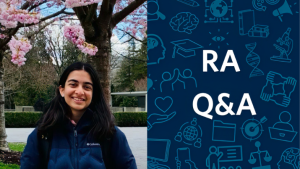

Keertana Sanghvi, a second-year undergraduate psychology student, aspires to be a counselor in the future. Her interest in developmental psychology led to being the Adult Research Assistant at the Center for Cognitive Development, led by Dr. Darko Odic, under the PSYC240 course. The Center for Cognitive Development investigates how children learn about the world around them. The Centre for Cognitive Development is especially interested in the origins of language and thought. In the lab, Keertana handles data collection, data entry, and preliminary analysis in the lab. She also actively collaborates in lab meetings with other members.
How did you first learn about PSYC240 and what motivated you to apply?
I discovered PSYC240 through the UBC Psychology Student Canvas Guide, a comprehensive resource. Intrigued by the prospect of gaining credits while immersing myself in empirical psychology research, I saw it as an opportunity to delve into the research process in a lab setting.
What intrigues you about research at this lab in particular?
The lab’s focus on understanding human development during critical stages resonated with my interest in developmental psychology. As a future counselor, contributing to unraveling the mysteries of developmental processes is highly motivating. Despite my role that involves working with adults rather than children, the interplay between results in these age groups is interesting, especially in the context of UBC CCD’s research on young children’s early intuitions and their impact on higher-order learning abilities.
What skills or experience did you gain from PSYC240 that you find valuable?
My responsibilities include data collection, entry, and preliminary analysis, emphasizing the importance of data quality. I’ve cultivated a strong work ethic and learned the vital quality of humility which involves recognizing the need for study adjustments, constructive feedback, and a commitment to learning from both successes and challenges. Engaging with diverse participants has also improved my communication skills.
What is your favourite part of working in the lab?
Participating in lab meetings with Dr. Odic, the lab coordinator, and fellow RAs has been the highlight of my experience. These bi-weekly sessions revolve around delving into research journal articles and fostering scholarly discussions. This combination of theoretical engagement and hands-on practical experience significantly enriches the overall learning journey.
Do you have any advice for students?
Even if research isn’t your goal, applying to research positions is worthwhile for the valuable skills and experiences gained. Keeping an open mind, applying to several labs, and actively reaching out to professors or research assistants to gather additional insights and advice is crucial. This approach not only maximizes your chances but also opens doors to diverse opportunities for growth and learning.


